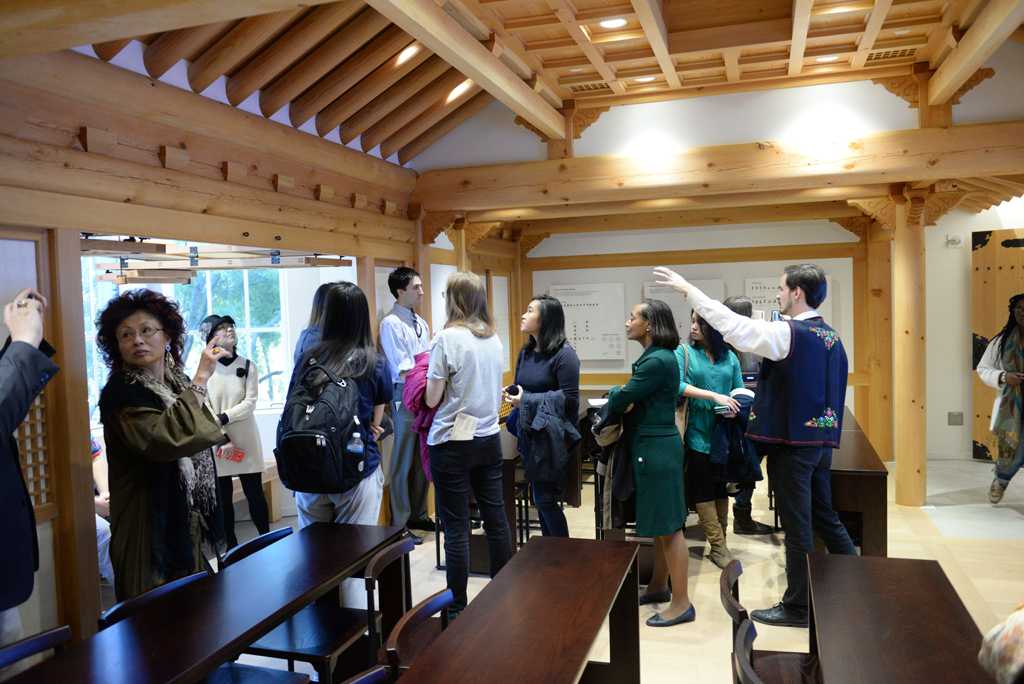Tours and secrets: Quo Vadis digs into Nationality Rooms


A tour group views the new Korean nationality room. Jeff Ahearn | Assistant Visual Editor
Each day, hundreds of students take classes in Pitt’s Nationality Rooms — but they probably don’t know that the furniture in the Armenian Room weighs about as much as seven Asian elephants.
Or, more practically, how to find the hidden electrical outlets in the Austrian Room.
Or that the Syria-Lebanon Room — originally the study of a wealthy businessman from the capital of Syria — is about 240 years old.
If they’d like to find out more, they should turn to Quo Vadis, the student organization of Nationality Room tour guides at Pitt. The group, whose name means “Where are you going?” in Latin, guides about 11,000 students, Pittsburghers and international diplomats a year, sharing the almost-secrets of the Cathedral of Learning’s 30 famous rooms.
But to become one of those visitors’ guides, potential Quo Vadis employees must undergo what some might call a lengthy training process — filing at least 40 to 50 hours of practice and passing a 30-page exam.
After touring Pitt and thinking the Nationality Rooms were “one of the coolest things” about Pitt, first-year anthropology major Reagan Harper signed up to become a Quo Vadis tour guide at the Fall Activities Fair.
Now, she hosts tours about once a week, guiding visitors through the time periods, architecture and art of each room.
“I don’t think the coolness has faded [since I began training],” Harper said in an email. “Training made [the rooms] even cooler because I got to know what everything was and the history behind it.”
Harper said she feels that being a tour guide — and getting to do inventory of the hundreds of Nationality Room items in storage — relates to her minor in museum studies.
“These rooms are beautiful and should be shared, so I love passing that knowledge on to others,” Harper said.
Junior history major and Quo Vadis Treasurer Alecia Caballero also joined Quo Vadis with museum work in mind.
“I want to work in a museum, so giving tours in the Cathedral is the best way to prepare,” Caballero said.
This academic year, about 30 out of 100 students continued training after going to the initial Quo Vadis meeting, making this year’s trainee group larger than usual.
The first four Nationality Rooms opened in 1938, but it wasn’t until 1944 that Dean of Women Helen Pool Rush started Quo Vadis. Previously, according to Michael Walter, the tour coordinator of the Nationality Rooms, students who were not official guides gave tours of the Nationality Rooms when visitors stopped by.
When she wasn’t traveling the globe, Rush, who graduated from Pitt in 1919, made the Pitt community her home for more than 70 years. Rush established Pitt traditions — such as Pitt’s Lantern Night for first-year women — while she served as dean of students and as vice chancellor of student affairs while at Pitt.
Rush originally kept Quo Vadis exclusive to women, Walter said, simply because of her position as dean of women. But when a man showed interest for the first time, around 1970, Quo Vadis’ leaders made the club co-ed.
Today, trainees go through a full semester of studying and training sessions before making about $10.86 for each hour and a half tour.
To one of the students on the club’s executive board, trainees point out the Roman and Greek mythology characters in the Austrian Room, note that visitors shouldn’t conflate St. Nicholas with Santa Claus in the Ukrainian Room and reference the traces of gold flakes in the Syrian-Lebanon Room.
The trainees receive feedback on their presentations down to the nitty-gritty details, such as saying “in Syrian culture” instead of “in their culture.”
“I’m looking for how they’ve taken in the information and used it to make an interesting story,” Walter said.
E. Maxine Bruhns, the current director of the Nationality Rooms, said Quo Vadis and the Nationality Rooms continue the beliefs of Ruth Mitchell Crawford, the original director of the rooms.
“Ruth used to say nobody grows on trees, everybody comes from somewhere,” Bruhns said. “We hope to tap those roots and make adults and children aware of their heritage.”
Max Adzema, a Quo Vadis tour guide who graduated in December 2015, said one of his favorite tours was guiding Chancellor Patrick Gallagher and his wife around the Cathedral a few years ago, before Gallagher became the chancellor.
“I gave the chancellor his first Nationality Room tour at Pitt,” Adzema said. “When he became chancellor, I ran into him a couple times and he recognized me.”
Adzema said he loves telling visitors new information about the building and its historical context as a Quo Vadis tour guide.
“I love showing people something new,” Adzema said. “They’re such wonderful pieces of architecture and art, but they’re not that well-known. I like the excitement of showing people something they’ve never seen before.”
While not as high-profile, Adzema said one of his favorite groups to give tours to is groups of senior citizens.
“They’re so interested in everything you have to say,” he said.
According to Walter, Quo Vadis is part of the University’s place in the Pittsburgh community.
“I think the existence of the club shows a value placed on representing Pitt’s role in the community, using its own students as ambassadors,” Walter said. “The longevity of the club speaks to the importance of that dynamic.”
Recent Posts
Opinion | School should be in the summer
Although this may be controversial, I believe that from this data, it is evident that…
Weathering the storm: Pittsburgh teams have tackled some of the toughest environments
The end of the year in western Pennsylvania is always marked by two things —…
Notes From an Average Girl // Notes on Book Banning
In this edition of Notes From an Average Girl, senior staff writer Madeline Milchman writes…
To Be Honest // Yup, it is that damn phone
In this edition of To Be Honest, staff writer Evin Verbrugge writes about her phone…
Meaning at the Movies | Portraying Toxic ‘Adolescence’
In this edition of Meaning at the Movies, staff writer Lauren Deaton explores the mini-series…
Opinion | Climate change requires radical, immediate action
Contributing editor Emma Hannan talks about the effects of climate change and the actions cities…

